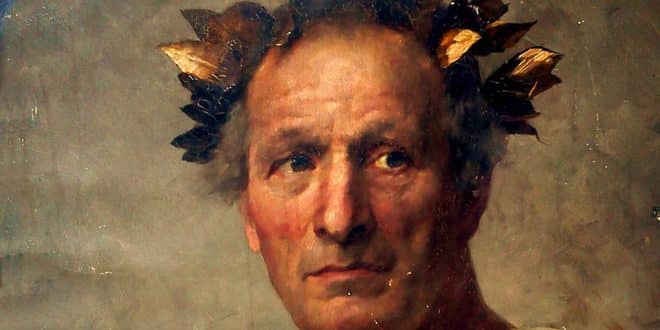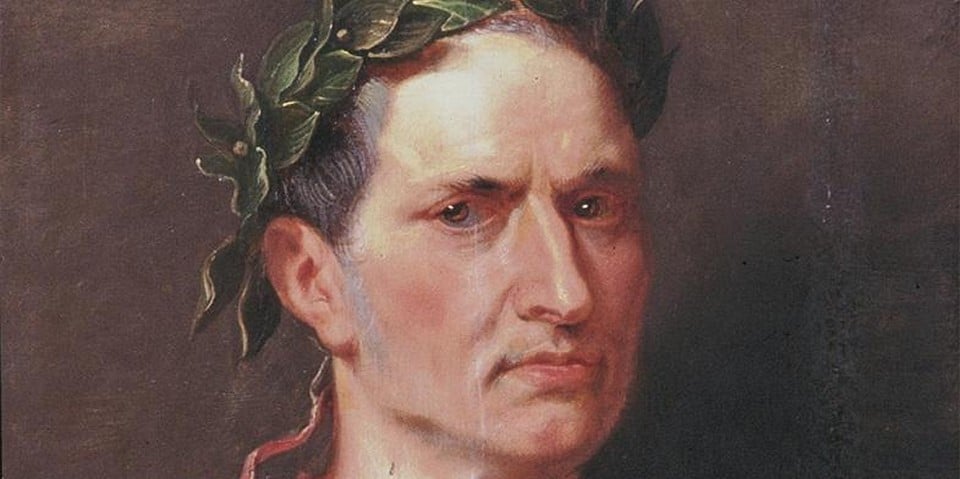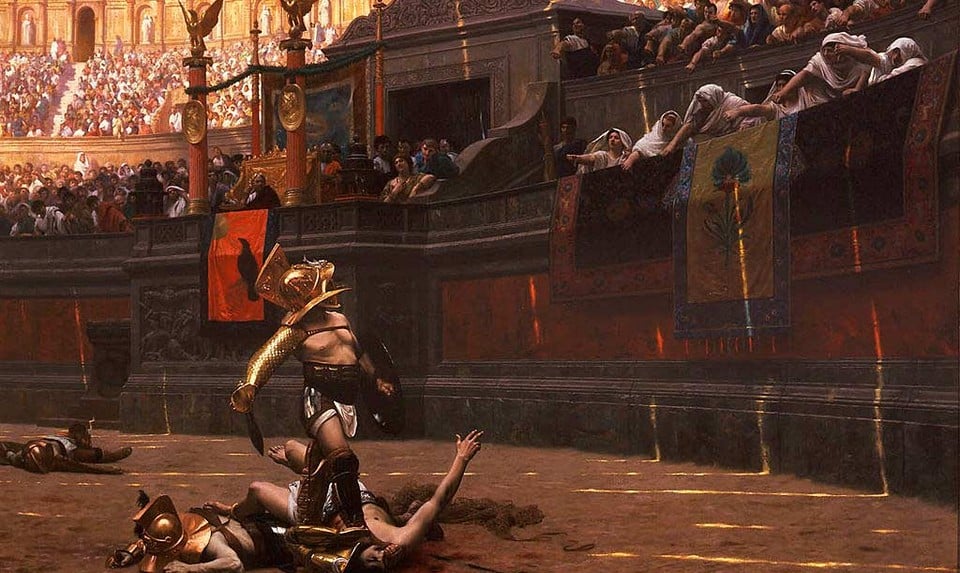Gaius Julius Caesar was a military commander, politician, writer, dictator, and high priest of Ancient Rome. He belonged to the ancient Roman ruling class and systematically rose to all the highest positions in the state, while maintaining a political rivalry with the senatorial aristocracy. He was merciful but ordered the execution of several of his main opponents.
Page Contents
Biography of Gaius Julius Caesar
The Julian family traced its origins to a noble lineage that was believed to have descended from the goddess Venus.
Caesar’s mother, Aurelia Cotta, came from a prominent and affluent family of the Aurelii. His paternal grandmother belonged to the ancient Roman Marcii family. Ancus Marcius, a member of that family, served as the fourth king of Ancient Rome from 640 to 616 BC.
Childhood and Youth
Exact information about the birth date of the emperor has not survived. It is generally accepted today that he was born in 100 BC, but the German historian Theodor Mommsen argues that it was in 102 BC, while the French historian Jerome Carcopino suggests 101 BC. His birthday is considered to be both July 12th and July 13th.
Gaius Julius Caesar spent his childhood in the impoverished ancient Roman district of Subura. His parents provided him with a good education. He studied Greek, poetry, and the art of oratory. He also learned how to swim, ride horses, and developed physically. In 85 BC, the family lost its breadwinner, and Caesar, after his initiation, became the head of the family since there were no surviving male relatives older than him.
- We recommend reading about the most influential Roman emperors.
Early Political Career of Gaius Julius Caesar
In Asia
In the 80s BC, the military commander Lucius Cornelius Cinna offered Gaius Julius Caesar the position of “flamen,” a priest of the god Jupiter. However, in order to assume this role, Caesar needed to undergo the ancient ceremonial marriage known as “confarreatio.” Lucius Cornelius chose his daughter Cornelia Cinilla to be Caesar’s wife. In 76 BC, the couple had a daughter named Julia.
Today, historians are uncertain about whether the inauguration ceremony for Julius took place. On one hand, it would have hindered his political activities, but on the other hand, the appointment would have been a way to solidify the position of the Julii.
After the betrothal of Gaius Julius and Cornelia, a mutiny occurred in the military, and the soldiers attacked Cinna, resulting in his death. Lucius Cornelius Sulla then established a dictatorship, and as a relative of Sulla’s opponent, Caesar was declared an outlaw. He defied Sulla, refused to divorce his wife, and left Rome. The dictator searched for the disobedient Caesar for a long time but eventually pardoned him at the request of Caesar’s relatives.
Soon, Caesar joined Marcus Minucius Thermus, the governor of the Roman province in Asia Minor – Asia.
Ten years prior, his father held that position. Julius became a cavalryman (equites) under Marcus Minucius, fighting as a mounted patrician. The first assignment given by Thermus to his contubernales was to negotiate with King Nicomedes IV of Bithynia. As a result of successful negotiations, the king provided Thermus with a fleet to capture the city of Mytilene on the island of Lesbos, which had resisted Roman rule after the First Mithridatic War (89-85 BC). The city was successfully captured.
For the operation in Lesbos, Gaius Julius received the civic crown, a military honor, and Marcus Minucius relinquished his authority. In 78 BC, Lucius Sulla died in Italy, and Caesar made the decision to return to his homeland.
Roman Events
In 78 BC, the military commander Marcus Lepidus organized a rebellion of the Italians (Italici) against Lucius’ laws. Caesar declined the invitation to join the rebellion. In 77-76 BC, Gaius Julius attempted to prosecute supporters of Sulla, such as the politician Cornelius Dolabella and the military commander Antonius Hybrida. However, despite his brilliant prosecution speeches, he was unsuccessful.
Afterward, Julius decided to visit the island of Rhodes and the rhetoric school of Apollonius Molon. However, on his way there, he fell into the hands of pirates and was later freed by Asian envoys in exchange for fifty talents. Seeking revenge, the former captive outfitted several ships and personally captured the pirates, crucifying them. In 73 BC, Caesar was included in the collegial governing body of the Pontiffs, a position previously held by his uncle Gaius Aurelius Cotta.
In 69 BC, Caesar’s wife Cornelia died while giving birth to their second child, who also did not survive. Around the same time, Caesar’s aunt, Julia Maria, also passed away. Shortly after, Gaius Julius became an ordinary Roman magistrate (magistratus), which granted him entry into the Senate. He was sent to Farther Spain (Hispania Ulterior), where he resolved financial matters and carried out assignments for the propraetor Antistius Vetus.
In 67 BC, Caesar married Pompeia Sulla, the granddaughter of Sulla. In 66 BC, Gaius Julius became the overseer of Rome’s most significant public road, the Appian Way (Via Appia), and financed its repairs.
Magisterial Collegium and Elections
In 66 BC, Gaius Julius was elected to the magistracy of Rome. His responsibilities included overseeing urban development, maintaining trade, and organizing public events. In 65 BC, he hosted memorable Roman Games featuring gladiators that managed to impress the sophisticated citizens of Rome.
In 64 BC, Gaius Julius served as the head of the permanent criminal court (Quaestiones perpetuae) for criminal trials, allowing him to hold many of Sulla’s followers accountable and impose punishments.
In 63 BC, Quintus Metellus Pius passed away, creating a vacancy for the position of Pontifex Maximus (High Priest) for life. Caesar decided to nominate himself for the role. His opponents were the consul Quintus Catulus Capitolinus and the military commander Publius Vatia Isauricus. Through numerous bribes, Caesar emerged victorious in the election and moved to live on the Sacred Road (via Sacra) in the pontiff’s official residence.
Participation in the Conspiracy
In 65 BC and 63 BC, one of the political conspirators, Lucius Sergius Catilina, attempted to carry out a coup twice. Marcus Tullius Cicero, an opponent of Caesar, tried to accuse him of involvement in the conspiracies but failed to provide the necessary evidence. Marcus Porcius Cato, an informal leader of the Roman Senate, also testified against Caesar, leading to threats against Caesar and his exclusion from the Senate.
The First Triumvirate
Praetorship
In 62 BC, utilizing the powers of his praetorship, Caesar intended to transfer the reconstruction plan of Jupiter Capitolinus from Quintus Catulus Capitolinus to Gnaeus Pompeius Magnus. However, the Senate did not support this proposal.
After Caesar supported the suggestion of tribune Quintus Caecilius Metellus Nepos to send Pompey with his troops to Rome to suppress Catiline, the Senate removed both Quintus Caecilius and Gaius Julius from their positions. However, the latter was quickly reinstated.
In the autumn, the conspirators involved in Catiline’s plot were put on trial. One of the participants, Lucius Julius Vettius, who spoke against Caesar, was arrested, as well as the judge Novius Niger, who accepted the accusation.
In 62 BC, Caesar’s wife Pompeia organized a celebration dedicated to the Good Goddess (Bona Dea) in their home, where only women were allowed to attend. However, one of the politicians, Publius Clodius Pulcher, disguised himself as a woman and attempted to meet Pompeia. When the senators learned of the incident, they considered it a disgrace and demanded a trial. Gaius Julius did not wait for the outcome of the trial and divorced Pompeia to avoid exposing his private life to public scrutiny, especially since the couple had not produced any heirs.
Gaius Julius Caesar In Farther Spain
In 61 BC, Gaius Julius’ journey to Farther Spain as a propraetor was delayed for a long time due to his significant debts. The military commander Marcus Licinius Crassus vouched for Gaius Julius and paid off a portion of his debts.
When the new propraetor arrived at his destination, he had to contend with the dissatisfaction of the local population towards Roman authority. Caesar assembled a militia and began fighting against the “bandits.” With a 12,000-strong army, the commander approached the Serra da Estrela mountain range and ordered the local inhabitants to leave. They refused to relocate, and Gaius Julius launched an attack. The mountain dwellers fled across the Atlantic Ocean to the Berlenga Islands, eluding their pursuers.
However, Caesar, through a series of calculated operations and strategic maneuvers, eventually subdued the people’s resistance. As a result, he was bestowed the honorary military title of imperator, signifying his victory.
Gaius Julius engaged in active governance and administration of the subordinate territories. He presided over judicial proceedings, implemented tax reforms, and abolished the practice of human sacrifices.
During his time in Spain, Caesar managed to settle most of his debts thanks to the generous gifts and bribes from the affluent residents of the southern region. In the early 60s BC, Gaius Julius voluntarily relinquished his bestowed powers and returned to Rome.
Тriumvirate
Rumors of the propraetor’s victories soon reached the Senate, and its members believed that Caesar’s return should be accompanied by a triumph, a grand entrance into the capital. However, according to the law, Gaius Julius was not allowed to enter the city until the triumphal event took place. Since Caesar also planned to participate in the upcoming consulship elections, where his personal presence was required for registration, the military commander declined the triumph and began his campaign for the new position.
Through the bribery of voters, Caesar eventually became consul. Alongside him, the military commander Marcus Calpurnius Bibulus also won the elections.
In order to strengthen their own political positions and consolidate their power, Caesar entered into a secret agreement with Pompey and Crassus, uniting two influential politicians with opposing views. As a result of this conspiracy, a powerful alliance of military leaders and politicians emerged, known as the First Triumvirate (triumviratus – “a union of three men”).
Consulship
In the early days of his consulship, Caesar began to propose new legislation to the Senate. The first law passed was the agrarian law, which allowed the poor to obtain plots of land from the state, which it acquired from wealthy landowners. Priority was given to large families. To prevent speculation, the new landowners were not allowed to sell their plots for the next twenty years. The second proposed law concerned the taxation of tax collectors in the province of Asia, reducing their contributions by one-third. The third law addressed bribery and extortion and was unanimously passed, unlike the first two.
To strengthen his bond with Pompey, Gaius Julius gave his daughter Julia in marriage to him. As for himself, Caesar married for the third time, this time to Calpurnia, the daughter of Lucius Calpurnius Piso Caesoninus.
Proconsul
Gallic War
After completing his term as consul, Gaius Julius Caesar continued to expand Roman territories. During the Gallic Wars (Bellum Gallicum), Caesar demonstrated remarkable diplomacy and strategy, skillfully capitalizing on the disagreements among Gallic leaders. In 55 BCE, he defeated the Germans who had crossed the Rhine (Rhein) and, within ten days, built a 400-meter bridge to launch the first-ever Roman attack against them. Caesar became the first Roman general to invade Great Britain, where he conducted several brilliant military operations before being compelled to withdraw from the island.
In 56 BCE, a meeting of the triumvirate was held in Lucca, where it was decided to continue and strengthen their mutual political support.
By 50 BCE, Gaius Julius Caesar had suppressed all rebellions, fully subjugating the territories that were once in opposition to Rome.
Civil War
Civil War ensued in 53 BCE after the death of Crassus, leading to the dissolution of the triumvirate. A power struggle erupted between Pompey and Caesar. Pompey assumed leadership of the republican faction, while the Senate did not extend Caesar’s authority in Gaul. In response, Caesar made the decision to initiate a rebellion. Gathering an army of immensely popular soldiers, he crossed the Rubicon, a border river, and swiftly captured several cities without encountering resistance. Frightened, Pompey and his close senators fled the capital. Caesar proposed joint rule to the remaining members of the Senate.
In Rome, Caesar was appointed as dictator. Attempts by Pompey to hinder Gaius Julius Caesar’s progress proved futile, as Pompey himself was killed in Egypt. However, Caesar did not accept his enemy’s head as a gift; instead, he mourned his death. While in Egypt, Caesar assisted Queen Cleopatra and conquered Alexandria (AIskandariya), and in North Africa, he incorporated Numidia (Numidia) into Rome.
Murder of Gaius Julius Caesar
Upon his return to the capital, Gaius Julius Caesar was greeted with a lavish triumph. He spared no expense in rewarding his soldiers and commanders, hosting feasts for the citizens, and organizing games and spectacles. Over the next ten years, he was hailed as “imperator” and “father of the fatherland.” He enacted numerous laws, including those pertaining to citizenship, the structure of the state, luxury restrictions, unemployment, and the distribution of free grain. Caesar also introduced changes to the system of timekeeping and other reforms.
Caesar was deified and received immense honors, with statues and portraits being erected in his honor. He enjoyed the best protection and personally appointed individuals to positions of power within the state.
Among the republicans, dissatisfaction grew regarding Caesar’s policies and behavior. They accused him of having a relationship with Queen Cleopatra, who had moved to the capital. In response, Marcus Junius Brutus and Gaius Cassius Longinus conspired to assassinate the dictator.
On March 15, 44 BCE, during a Senate session, Brutus plunged a dagger into Caesar, resulting in his demise. Gaius Julius Caesar’s sole heir was his adopted grandnephew, Octavian Augustus. Explore the series of articles on Caesar’s assassination and the rise of Octavian.
Interesting Facts about Gaius Julius Caesar
- Gaius Julius Caesar, born on July 12, 100 BC, was a Roman military general and statesman who played a pivotal role in the transition of Rome from a republic to an empire, leaving a lasting impact on history.
- Caesar’s military campaigns in Gaul expanded Rome’s territory, showcased his strategic brilliance, and solidified his influence and popularity among the Roman people, establishing him as a formidable leader.
- He implemented reforms to address social and economic issues, including land redistribution, debt relief, and the reorganization of the calendar, leaving a lasting legacy of progressive governance.
- Caesar’s crossing of the Rubicon River in 49 BC defied Roman law, sparking a civil war against his rival Pompey and ultimately resulting in his rise to power as the dictator of Rome, forever changing the course of the republic.
- As dictator, Caesar initiated ambitious projects, such as the construction of new public buildings, infrastructure improvements, and the granting of Roman citizenship to more people across the empire, transforming Rome’s landscape and society.
- On the Ides of March in 44 BC, Julius Caesar was assassinated by a group of senators led by Brutus and Cassius, resulting in political chaos and the eventual rise of Augustus as the first Roman emperor, marking a turning point in Roman history.
- Caesar’s legacy endures through his military accomplishments, political reforms, and his influence on the subsequent history of Rome, making him one of the most iconic and influential figures of ancient Rome.
 Italy for me From Italy with love
Italy for me From Italy with love



